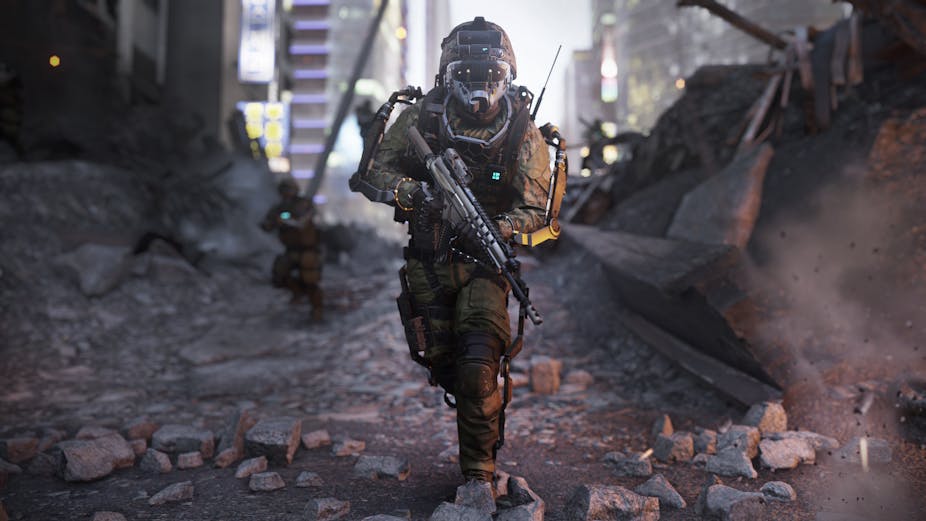The latest instalment of wildly popular videogame Call of Duty, Advanced Warfare, shows the narratives of today’s games can reveal the motives behind real-world politics.
Over the past decade, fictional videogame adversaries have expanded to regularly include those of Middle Eastern, Chinese or even North Korean origin, reflecting the changing times. However there is another internal element within the US state – a military-industrial complex – that is little studied. Its key role in shaping foreign policy is made explicit through the narratives of military games.
Spaces for thinking differently
There is a growing desire to understand the so-called “exceptionalism” of US foreign policy that has become more apparent following the September 11 terrorist attacks in 2001. This is the idea that the US is so uniquely vulnerable and threatened that its responses should not be constrained by the international laws that govern other states. Why does the US react in this way – and is it justified in doing so?
Videogames offer a lens through which to examine US attitudes and to understand contemporary US foreign policy. Military games tend to depict the US as threatened, for example the narrative of Homefront is of the US having been invaded by North Korea, whose troops carry out atrocities against civilians. In the [Call of Duty: Modern Warfare series](http://callofduty.wikia.com/wiki/Modern_Warfare_(series), the US is threatened by nuclear weapons and subjected to full-scale invasion. In these examples, that sense of US vulnerability is realised: the feared invasions and attacks occur and the enemy forces are beyond reason and cannot be negotiated with.
Games with this line of narrative affirm the stance that the US should not be bound by the rules that constrain others. In these aspects, the military video games precisely underscore the sentiments behind an exceptionalist US foreign policy.
The subversive military
Yet military games also depict ambiguities in the role of US military power that play into another trope. In his farewell address to the nation in 1961, then US president Dwight D Eisenhower warned the US public of the dangers of what he termed the “military-industrial complex”. Sociologist C Wright Mills had earlier conceived of a “power elite” in which American power was concentrated within political, military and industrial institutions, capable of turning the US into a “permanent war economy” such that “virtually all political and economic actions are now judged in terms of military definitions of reality”.
A military-industrial complex is a prominent theme in many videogames, films and television programmes – for example the Bourne series of films (and books), the film Enemy of the State, and television series 24. It is presented as an insidious power within American politics, an alliance between political and military elites that echoes Mills’s concerns.
Enemies within
Perhaps the clearest example of this narrative within games is Splinter Cell: Conviction. With a similar conspiracy-laden story to the Bourne films, the game places you in the role of ex-Special Forces operative Sam Fisher, tempted out of retirement by his former handler with the promise of information about why and how Fisher’s daughter was killed. It is revealed that his daughter is in fact not dead but held captive by members of a secret US government counter-terrorist unit, Third Echelon, as leverage to control Fisher. The plot also includes a private military contractor (“Black Arrow”) which colludes with Third Echelon to overthrow the liberal president Patricia Caldwell (America’s first female president) and her desires to downscale the US military.
The game Call of Duty: Modern Warfare 2 spins a narrative that involves a conspiracy of convenience between a hawkish US military general and a Russian ultra-nationalist with similar motivations to enhance his country’s military credibility, who conspire to have Russia invade the US. Both are seen as out-of-date products of the Cold War, whose overwhelming desire to maintain their nations’ military capabilities lead to all out global war.
The latest Call of Duty game, Advanced Warfare, places the player in the role of a former US Marine working for a private security corporation, Atlas, fighting the KVA terrorist network. Set in the near future of 2054-60, initially the game conforms to a typical post-9/11 narrative arc: fighting terrorists in Nigeria, the US and Greece. As the game unfolds, however, it becomes clear that the terrorists and Atlas are collaborating. Atlas is protecting the considerable political and economic gains it has made through largely replacing the US armed forces and profits from the insecurity that the terrorists cause. It is up to the player/character, Jack Mitchell, to reveal the conspiracy.
Saying the un-sayable
There is a common but paradoxical trend among military games – that they are frequently criticised for celebrating war, their narratives in fact provide a means to critically reflect on the nature of war in the 21st century. Here the portrayal of the integral role played by the military-industrial complex in demands for a US exceptionalist foreign policy provides a quite different explanation to official justifications for going to war.
We must re-examine the foundational myths that US exceptionalism is the product of American ideology – bound up in notions of “beacon of democracy”, “God’s country” or a nation with a “unique destiny”. If instead it is the product of a military-industrial complex that serves to justify war under the cloak of exceptionalism, then this raises very serious implications not only for the academic scholarship – or lack thereof – in this area, but also for the veracity of justifications offered to the public.

